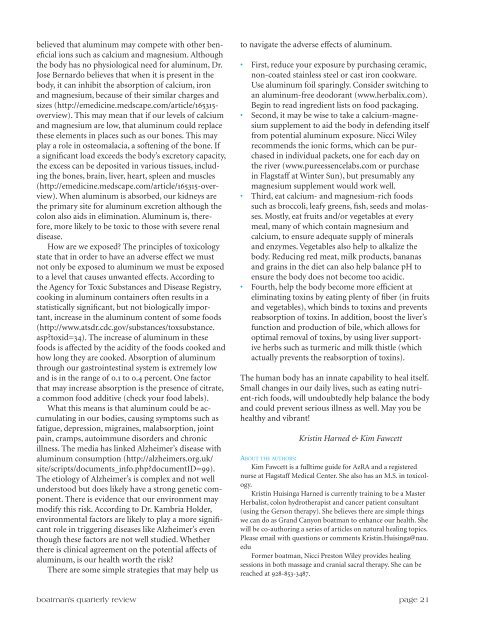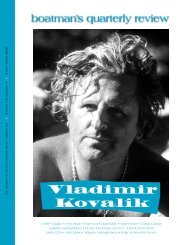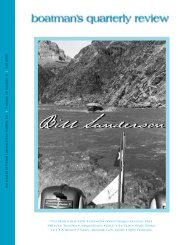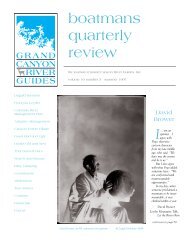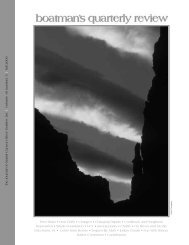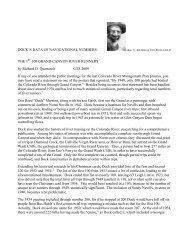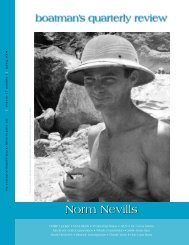fall 11 / 24:3 - Grand Canyon River Guides
fall 11 / 24:3 - Grand Canyon River Guides
fall 11 / 24:3 - Grand Canyon River Guides
- No tags were found...
You also want an ePaper? Increase the reach of your titles
YUMPU automatically turns print PDFs into web optimized ePapers that Google loves.
elieved that aluminum may compete with other beneficialions such as calcium and magnesium. Althoughthe body has no physiological need for aluminum, Dr.Jose Bernardo believes that when it is present in thebody, it can inhibit the absorption of calcium, ironand magnesium, because of their similar charges andsizes (http://emedicine.medscape.com/article/165315-overview). This may mean that if our levels of calciumand magnesium are low, that aluminum could replacethese elements in places such as our bones. This mayplay a role in osteomalacia, a softening of the bone. Ifa significant load exceeds the body’s excretory capacity,the excess can be deposited in various tissues, includingthe bones, brain, liver, heart, spleen and muscles(http://emedicine.medscape.com/article/165315-overview).When aluminum is absorbed, our kidneys arethe primary site for aluminum excretion although thecolon also aids in elimination. Aluminum is, therefore,more likely to be toxic to those with severe renaldisease.How are we exposed? The principles of toxicologystate that in order to have an adverse effect we mustnot only be exposed to aluminum we must be exposedto a level that causes unwanted effects. According tothe Agency for Toxic Substances and Disease Registry,cooking in aluminum containers often results in astatistically significant, but not biologically important,increase in the aluminum content of some foods(http://www.atsdr.cdc.gov/substances/toxsubstance.asp?toxid=34). The increase of aluminum in thesefoods is affected by the acidity of the foods cooked andhow long they are cooked. Absorption of aluminumthrough our gastrointestinal system is extremely lowand is in the range of 0.1 to 0.4 percent. One factorthat may increase absorption is the presence of citrate,a common food additive (check your food labels).What this means is that aluminum could be accumulatingin our bodies, causing symptoms such asfatigue, depression, migraines, malabsorption, jointpain, cramps, autoimmune disorders and chronicillness. The media has linked Alzheimer’s disease withaluminum consumption (http://alzheimers.org.uk/site/scripts/documents_info.php?documentID=99).The etiology of Alzheimer’s is complex and not wellunderstood but does likely have a strong genetic component.There is evidence that our environment maymodify this risk. According to Dr. Kambria Holder,environmental factors are likely to play a more significantrole in triggering diseases like Alzheimer’s eventhough these factors are not well studied. Whetherthere is clinical agreement on the potential affects ofaluminum, is our health worth the risk?There are some simple strategies that may help usto navigate the adverse effects of aluminum.• First, reduce your exposure by purchasing ceramic,non-coated stainless steel or cast iron cookware.Use aluminum foil sparingly. Consider switching toan aluminum-free deodorant (www.herbalix.com).Begin to read ingredient lists on food packaging.• Second, it may be wise to take a calcium-magnesiumsupplement to aid the body in defending itselffrom potential aluminum exposure. Nicci Wileyrecommends the ionic forms, which can be purchasedin individual packets, one for each day onthe river (www.pureessencelabs.com or purchasein Flagstaff at Winter Sun), but presumably anymagnesium supplement would work well.• Third, eat calcium- and magnesium-rich foodssuch as broccoli, leafy greens, fish, seeds and molasses.Mostly, eat fruits and/or vegetables at everymeal, many of which contain magnesium andcalcium, to ensure adequate supply of mineralsand enzymes. Vegetables also help to alkalize thebody. Reducing red meat, milk products, bananasand grains in the diet can also help balance pH toensure the body does not become too acidic.• Fourth, help the body become more efficient ateliminating toxins by eating plenty of fiber (in fruitsand vegetables), which binds to toxins and preventsreabsorption of toxins. In addition, boost the liver’sfunction and production of bile, which allows foroptimal removal of toxins, by using liver supportiveherbs such as turmeric and milk thistle (whichactually prevents the reabsorption of toxins).The human body has an innate capability to heal itself.Small changes in our daily lives, such as eating nutrient-richfoods, will undoubtedly help balance the bodyand could prevent serious illness as well. May you behealthy and vibrant!Kristin Harned & Kim FawcettAbout the authors:Kim Fawcett is a fulltime guide for AzRA and a registerednurse at Flagstaff Medical Center. She also has an M.S. in toxicology.Kristin Huisinga Harned is currently training to be a MasterHerbalist, colon hydrotherapist and cancer patient consultant(using the Gerson therapy). She believes there are simple thingswe can do as <strong>Grand</strong> <strong>Canyon</strong> boatman to enhance our health. Shewill be co-authoring a series of articles on natural healing topics.Please email with questions or comments Kristin.Huisinga@nau.eduFormer boatman, Nicci Preston Wiley provides healingsessions in both massage and cranial sacral therapy. She can bereached at 928-853-3487.boatman’s quarterly review page 21


